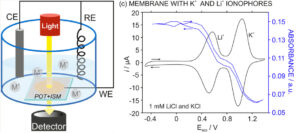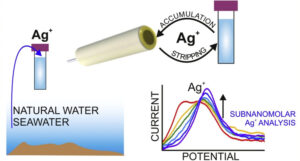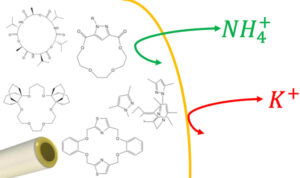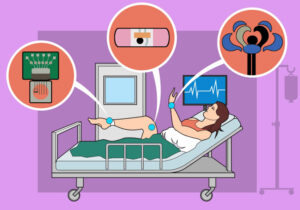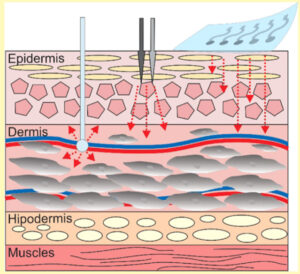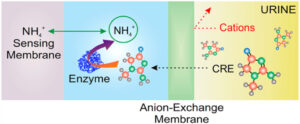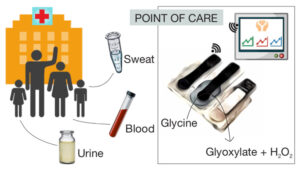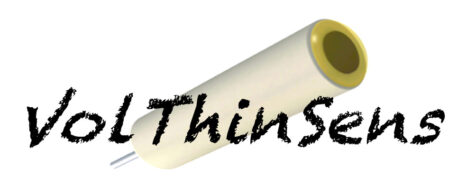

‘Challenging societal needs involving ions detection: New strategies for the development of voltammetry ion sensors based on thin membranes’
MSCA-Individual Fellowships (Agreement Nr 792824)
€ 185 857,20
Starting date: 01.11.2018
Program: H2020-EU.1.3.2. – Nurturing excellence by means of cross-border and cross-sector mobility
Ultrathin membranes are the key element for new ion sensors able to act in real contexts and samples. The project addresses challenging ion analysis cases in pharmaceutical/clinical and environmental domains’
Modern society is evolving to a scenario in which all daily activities will be monitored using smart sensors. The provision of rapid, reliable and decentralized data is crucial and chemical sensors are current candidates for this purpose. VolThinSens puts forward an innovative sensing strategy from the ground up for reliable detection of ions addressing problems that constitute the bottleneck for the final application of electrochemical sensors in real contexts. VolThinSens will provide robust ion sensors with a wide application perspective within EU priorities such as “citizens’ welfare” and “protecting nature”, among others. VolThinSens will enhance EU excellence and competitiveness in pharmacological/clinical control as well as water issues through the provision of trustable relevant data.
01.03.2021
In the ‘Chemical Sensing Unit’ at KTH Royal Institute of Technology, we have started an internal seminar series in which every Friday the postdoc and PhD students in the group present and discuss their projects…fighting with social distance restrictions always with a smile.
Some of the participants:
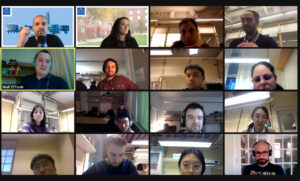
18.02.2021
Happy to share the very first single-author paper of Asst. Prof. Maria Cuartero in the journal Sensors & Actuators B: Chemical.
https://www.sciencedirect.com/science/article/pii/S0925400521002033
03.02.2021
Asst. Prof. Maria Cuartero has been appointed as part of the Early Career Advisory Board in Analysis & Sensing journal.
14.01.2021
Supporting the #nomorematildas program in the gender equality panoarama.
https://www.nomorematildas.com
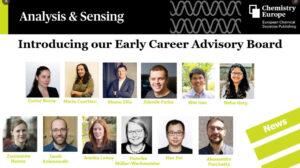
03.09.2020
Asst. Prof. Maria Cuartero has been the coordinator of Symposium 1 ‘Membrane-based electrodes: from traditional potentiometry to dynamic electrochemistry’ in the online version of the 71 Annual Meeting of the International Society of Electrochemistry. Asst. Prof. Maria Cuartero has presented the results of the VolThinSens project in an oral presentation with the title ‘The Role of Poly(3-octylthiophene) –POT– as Redox Mediator of Ion Fluxes Across Voltammetric Thin Membranes’
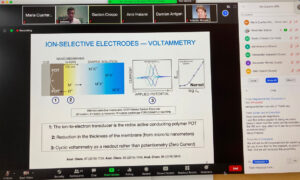
28.06.2020
Asst. Prof. Maria Cuartero has been appointed as part of the Topic Board in Chemosensors.

11.06.2020
Asst. Prof. Maria Cuartero presents some of the results within the VolThinSens project in her talk at the TFK seminar series (KTH Royal Institute of Technology).
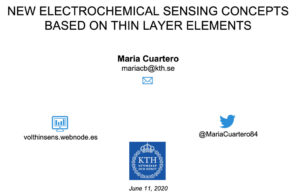
06.05.2020
Let’s get some inspiration in this difficult time…

15.04.2020
Promotion: ‘Asst. Prof. Maria Cuartero…Sounds Good!!’
03.04.2020
Due to the Covid19 situation, the research program of the VolThinSens is suffering some delays. We are remotely managing research, teaching and family communication….Hoping for better times
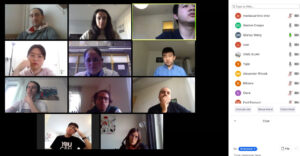
13.12.2019
New synchrotron expedition to study the sensors developed in the VolThinSens project
https://www.elettra.trieste.it
Thanks to CERIC for the travel support
27.11.2019
Prof. Fabiana Arduini (University Tor Vergata, Rome, Italy) was invited by the VolThinSens project to give a talk about ‘Electrochemical Paper-based (Bio)Sensors’. Paper is indeed a good substrate to translate the sensing concept developed in the VolThinSens project in a medium-term perspective.
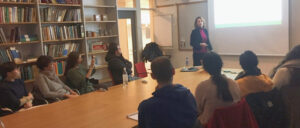
06.08.2019
Invited Keynote about the results in the VolThinSens project. 70th Annual Meeting of the International Society of Electrochemistry (Durban, Southafrica)
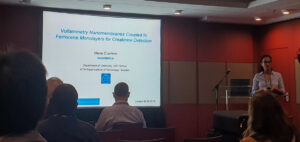
26.07.2019
Celebrating a unique achievement!!! It will be officially announced in few weeks!!!
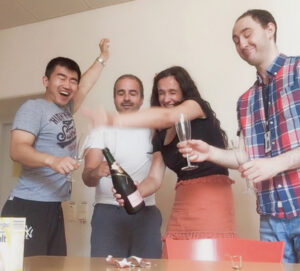
04.06.2019
Receiving the Early Career Analytical Electrochemistry Prize of the International Society of electrochemistry in Durban (Southafrica).
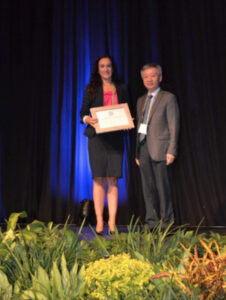
01.05.2019
The VolThinSens project is hosted by @CrespoLab, a young group of researchers at KTH leaded by Asst. Prof. Gaston Crespo. Updated picture of the team
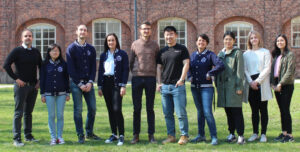
30.04.2019
Thanks to Marie Curie Alumni for the support to conference attendance to MSCA fellows.
26.04.2019
Rising Starts event organised by @WOP at KTH. Promoting gender equality actions from the VolThinSens project.
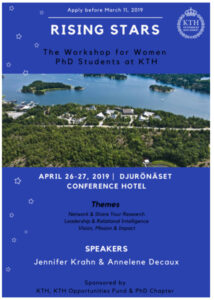
18.04.2019
Our review on ‘Wearable Potentiometric Sensors for Medical Applications’ has reached more than 770 visits during its first week of publication and has been highlighted as one of the ‘Featured Papers’ in SENSORS journal.
In the newsletter of this month, it is also announced that Dr. Maria Cuartero has obtained one of the SENSORS AWARDS 2019
The newsletter:
https://www.mdpi.com/message/f57fbd5495c102bef040216261b7f5c0/90549d2c073f8befc7040c3607b64264
The paper:
11.04.2019
Working at the ‘Stronger Together Mingle’ organized by WOP@KTH. Promoting gender equality actions from the VolThinSens project.
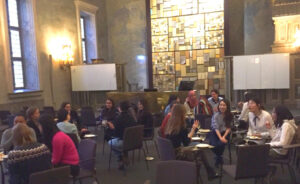
13.02.2019
OpenLab Day with the Hamedi’s team at KTH. Establishing fruitful collaborations within the VolThinSens project frame.
02.02.2019
Dr. Maria Cuartero is a new member of the Marie Curie Alumni Association.
01.02.2019
2019 SENSORS AWARDS granted to Dr. Maria Cuartero
22.01.2019
Workshop on Personal Impact Plan at KTH: ‘A broader perspective on future societal impact of your research’
11.12.2018
Synchrotron expedition to study the sensors developed in the VolThinSens project
https://www.elettra.trieste.it
Thanks to CERIC for the travel support
06.11.2018
Being part of WOP@KTH
https://www.kth.se/social/group/female-phd-student-2/
«Life is not easy for any of us. But what of that? We must have perseverance and above all confidence in ourselves. We must believe that we are gifted for something and that this thing must be attained.» (Marie Curie)
01.11.2018
Official kick-off of the VolThinSens project at KTH Royal Institute of Technology
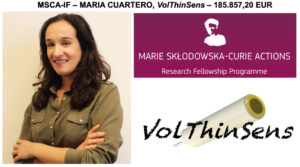
27.09.2018
MSCA Monitoring Visit at KTH Royal Institute of Technology
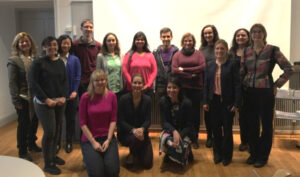
14.06.2018
Celebrating the Chemistry Day at the Department of Chemistry at the CBH School in KTH. The Chemistry Department is hosting the VolThinSens project.

07.04.2018
Early Career Analytical Electrochemistry Prize awarded to Dr. Maria Cuartero by the International Society of Electrochemistry
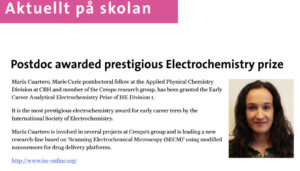
01.02.2018
Official communication that VolThinSens has been granted
i) ‘Self-Assembled monolayers on glassy carbon electrodes providing effective charge transfer to promote ion-transfer process across ultra-thin ion-selective membranes.’
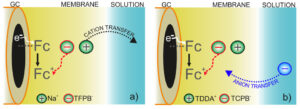 https://www.sciencedirect.com/science/article/pii/S0013468619310242#ack0010
https://www.sciencedirect.com/science/article/pii/S0013468619310242#ack0010
ii) ‘Understanding the working mechanism behind the sensors developed in the VolThinSens project’
iii) ‘Stripping ion-transfer voltammetry to decrease the limit of detection of ultra-thin membranes. The case of silver ion detection in water.’
https://www.sciencedirect.com/science/article/pii/S092540052030798X#fig0040
https://www.sciencedirect.com/science/article/pii/S0925400519309815
iv) ‘Revising the field of environmental analysis to demonstrate the potential of the VolThinSens project in EU water issues’
https://www.sciencedirect.com/science/article/pii/S0925400521002033
https://pubs.rsc.org/lv/content/articlehtml/2020/an/d0an00327a
v) ‘Revising the field of wearable potentiometric sensors for clinical application to demonstrate the potential of the VolThinSens project in EU healthcare domain’
vi) ‘Cytotoxicity studies of ion-selective membranes and wearable devices’
vii) ‘What are the cases in where the ion-selective electrodes developed in VolThinSens could be integrated for ions monitoring in biological fluids?
Wearable patches for sweat analysis:
https://pubs.acs.org/doi/full/10.1021/acs.analchem.9b02126
https://pubs.acs.org/doi/full/10.1021/acs.analchem.0c02211
Thin-layer potentiometry for the biodetection of creatinine by indirect ammonium sensing:
https://www.sciencedirect.com/science/article/pii/S0956566319300776#ack0005
https://pubs.acs.org/doi/abs/10.1021/acs.analchem.9b05231
Glycine biosensing by means of peroxide or ammonium detection:
https://www.mdpi.com/1424-8220/20/14/4049
https://www.sciencedirect.com/science/article/pii/S0956566321001913
viii) ‘Side results from collaborative projects.
i) Collaboration with Prof. Joaquin A. Ortuno (University of Murcia, Spain) in the development of new amperometric biosensors:
‘A sustainable amperometric biosensor for the analysis of ascorbic, benzoic, gallic and kojic acids through catechol detection. Innovation and signal processing’
https://pubs.rsc.org/hy/content/articlehtml/2020/an/c9an02523e
ii) Collaboration with Prof. Roland de Marco in synchrotron-based measurements and Prof. Gaston A. Crespo in the acidification of water samples confined into thin layer domains for alkalinity detection:
‘Polyaniline Films as Electrochemical-Proton Pump for Acidification of Thin Layer Samples’
